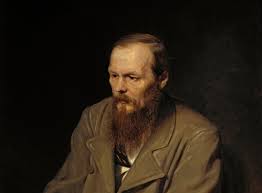“The really great men must
have great sadness on earth,” Dostoevsky wrote in Crime and Punishment. Dostoevsky
believed that enlightened intelligence and deep heart can only come through
much pain and suffering. Raskolnikov, the protagonist of Crime and
Punishment, is intelligent. But he does not have a loving heart. On the
contrary, he detests humankind. He thinks of the human species as essentially
evil – cruel, scoundrelly and corrupt. There is nothing wrong in doing away
with some of these evil creatures. In fact, if you want to be another great
person like Napoleon, if you want to be the Nietzschean superman, you need to
rise above the sentimental morality of mediocre people. So Raskolnikov goes and
commits a murder. He kills an old woman whom he thinks of as an evil person. In
the process, he ends up killing an innocent woman too in order to get rid of
the witness to his crime.
Raskolnikov
does not become a Napoleon or a superman, however. He is tormented by the murders
he has committed. He suffers much as his mind is racked with guilt. But he is
incapable of accepting his guilt. His mind does not let him see the murders he
has committed as a crime. And his heart is yet to evolve.
Sonia, a poor
woman who has become a prostitute in order to look after her ailing sister and
that sister’s children, is the one who helps Raskolnikov’s heart to evolve. A
prostitute may be a much better human being than an intellectual! A perverted
mind is far more treacherous than a mediocre heart.
What matters
more in the end is the heart. Sonia the fallen woman becomes the redeemer of
Raskolnikov the intellectual superman. The heart wins over the brain. Any
philosophy or ideology that cuts you off from your fellow beings is utterly
evil. To perceive the moral ugliness of hate-peddling ideologies, you need a
heart, an evolved one at that.
Evolved
hearts are not common among human beings. Most people have mediocre hearts and
hence humanity is trapped in the quagmire of banality. But that banality may be
less evil than the corrupted philosophy of people like Raskolnikov which
alienates them from humanity.
While in the
prison of Siberia at the end, Raskolnikov falls seriously ill and has a dream.
He dreams that a virus is sweeping the country. The virus creates a kind of
madness in its victims which makes each to think of him-/herself the sole
possessor of truth.
The most worthwhile
truth lies in the heart, not in the mind. And that truth is not singular. That truth
is common to the entire humanity. Unless you learn that truth – the truth of
the heart – you remain subhuman even if you are following the highest ideals
preached by some theory or ideology. Humanity stands above all theory and
ideology. Even if its heart is banal.
“Go at once,
this minute, stand at the crossroads, bow down, first kiss the earth which you
have defiled and then bow down to all the world and say to men aloud, ‘I am a
murderer!’” This is Sonia’s counsel to Raskolnikov when she learns about the
murders he committed. Put aside all your ideology and reasoning. Get your heart
out. Your only chance of redemption lies there – in your heart’s ability to
establish a bond with the rest of humanity.
 |
| Dostoevsky |
xzx

"Put your heart out." Would solve all of our problems if it were the default setting of human beings.
ReplyDeleteI met a friend recently who considers Dostoevsky her mentor. His words, she told me, connected so deeply with her that she saw her 'pain' as a 'natural state of being'--something to help her get deeper into her understanding of the self rather than an unnatural state to be healed out of. She's put the idea in my head that I must read Crime and Punishment again. Honestly, when I tried to read it in my early twenties, I couldn't go past the first few pages.
Your post is a sign that I must get myself a copy.
Thank you for writing it.
Dostoevsky demands patience from readers but he's worth it. He's one of my favorite writers.
DeleteHari om
DeleteMine too! Another enjoyable summarry from you. YAM XX
It's hard to justice to any Dostoevsky novel in a few hundred words. I looked at this one from a very limited perspective.
DeleteGet your heart out. Your only chance of redemption lies there – in your heart’s ability to establish a bond with the rest of humanity.
ReplyDeleteSuch an engaging review from you. I haven't read this book but the above lines about redemption and bonding with humanity has inspired me to read this book ASAP.
It's a classic worth a deep read.
Delete